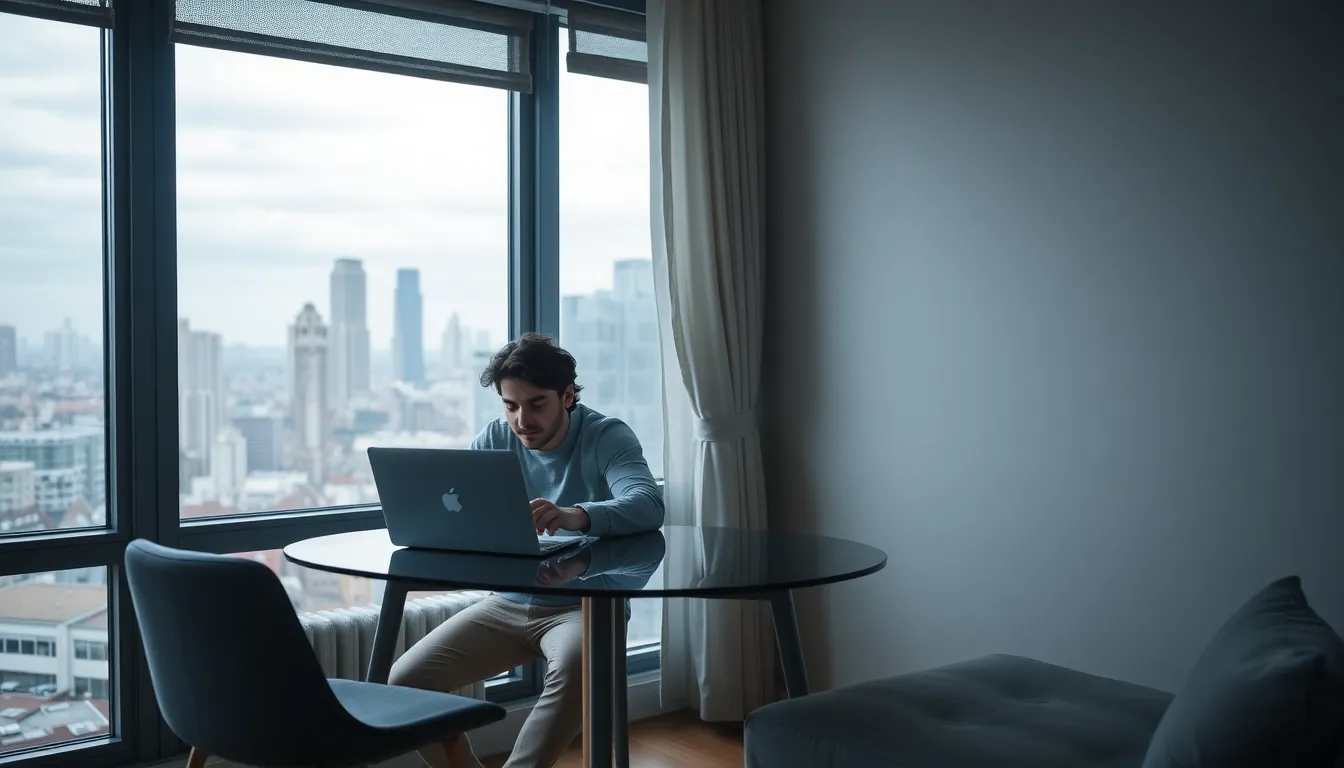When the economy takes a nosedive, the age-old debate of renting versus buying becomes as heated as a game of Monopoly gone wrong. Should one dive headfirst into the deep end of homeownership or stay afloat with the flexibility of renting? It’s a question that can keep anyone up at night—especially if they’ve just had a bad round of coffee.
Table of Contents
ToggleUnderstanding Economic Downturns
Economic downturns refer to periods when economic activity slows, leading to reductions in consumer spending, business investment, and job creation. During these times, unemployment rates often rise, which can significantly impact individuals’ financial stability. This instability makes the decision to rent or buy a home more critical.
Renting offers flexibility, allowing individuals to adapt quickly to changing financial situations. For example, if someone loses their job during an economic downturn, it’s easier to vacate a rental agreement than to manage the complexities of selling a home. Renters can adjust their living arrangements as needed without the burden of long-term commitments.
Buying a home, on the other hand, often involves substantial financial investment and potentially long-term repercussions. Homeownership generally ties individuals to mortgage payments, property taxes, and maintenance costs. If home values decline during an economic downturn, homeowners may find themselves in a precarious situation, facing negative equity where the home’s value is less than the mortgage owed.
Decision-making during these periods requires careful consideration of local housing markets. In some areas, property values may stabilize or even rise post-downturn, while others could suffer for years. Remaining informed about market trends is essential to making the most beneficial choice.
Data may reflect the average duration of economic downturns, which can last from a few months to several years, influencing market responses. Monitoring economic indicators such as inflation rates and job growth assists in understanding potential impacts on renting or buying decisions. Ultimately, individuals must weigh their financial situations, market conditions, and personal preferences when faced with these choices during uncertain times.
The Case for Renting

Renting offers several advantages during economic downturns. Many individuals appreciate the flexibility that renting provides, enabling quick adjustments to their living situations without the burden of homeownership.
Flexibility and Mobility
Renting allows individuals to relocate easily in response to job changes or family needs. Job loss can create urgent financial challenges, so the ability to move without the complications of selling a home eases stress. Lease agreements typically range from six months to a year, granting renters the option to reevaluate their housing situations regularly. In a rapidly changing economy, this flexibility can prove invaluable. Renters can also prioritize different locations, seeking more affordable areas without long-term commitments.
Lower Upfront Costs
Lower upfront costs accompany renting, typically requiring only a security deposit and the first month’s rent. This arrangement contrasts sharply with the financial demands of buying a home, which includes down payments, closing costs, and various fees. Significant cash savings become crucial during economic uncertainty. Renters avoid additional expenses, such as property taxes and maintenance costs, allowing for more budget flexibility. Statistically, the average cost of renting can be up to 30% less than that of homeownership during economic downturns, further highlighting the financial benefits of renting.
The Case for Buying
Buying a home during economic downturns offers several advantages that warrant consideration. Individuals see potential long-term benefits alongside immediate economic challenges.
Long-Term Investment Potential
Many view homeownership as a solid long-term investment opportunity. Homes often appreciate in value over time, providing owners with equity growth that renting does not offer. For instance, historically, the average annual increase in home values has been around 3-4%. Homebuyers secure this appreciation, which can contribute to overall wealth building. Those who purchase homes during downturns may access properties at discounted prices, enhancing future returns if market conditions improve. Investing in real estate creates a sense of ownership and stability, which many prioritize during uncertain times.
Stability in Housing Costs
Homeownership provides predictable housing costs, with fixed mortgage payments that don’t change over time. Renters face potential rent increases during lease renewals, creating uncertainty in long-term financial planning. In contrast, homeowners can budget more effectively, knowing their payments remain constant. Interest rates that are lower during downturns can lead to more affordable mortgage payments. Individuals benefit from stability, as fixed costs align their expectations with financial realities. This assurance helps them navigate economic fluctuations more confidently.
Factors to Consider
Deciding between renting and buying during economic downturns involves careful evaluation of multiple factors. Personal financial situations and prevailing market conditions play crucial roles in this decision-making process.
Personal Financial Situation
Individuals must assess their financial health before making housing decisions. Income stability affects the ability to manage mortgage payments alongside other expenses. Those with a strong emergency fund have a safety net during tough times. Evaluating existing debts is essential, as high debt-to-income ratios can limit purchasing power. Job security also influences choices, especially if employment appears uncertain. Renters often experience lower financial commitment, enabling them to adjust their financial plans swiftly. Maintaining flexibility becomes vital during economic uncertainty, particularly for those anticipating income fluctuations.
Market Conditions
Current market conditions significantly impact the decision to rent or buy. Individuals should research local housing markets, as prices can vary widely across regions. During downturns, properties often sell at lower prices, creating buying opportunities. Consumer confidence tends to wane, resulting in slower market activity. Monitoring interest rates is essential, as lower rates can make homeownership more attainable. Conversely, declining home values can present risks for buyers who might face negative equity. Sellers may struggle to find buyers, increasing rental availability. Timing in relation to market recovery can determine whether renting or buying becomes the more advantageous option.
Navigating the choice between renting and buying during economic downturns requires careful consideration. Each option presents unique advantages and challenges that can significantly impact financial stability and personal circumstances. Renting offers flexibility and lower upfront costs which can be crucial in uncertain times. On the other hand, buying a home can lead to long-term financial benefits and stability in housing costs.
Ultimately, individuals must weigh their financial health against market conditions to make informed decisions. By staying informed and assessing personal priorities, they can choose the path that best aligns with their goals and the economic landscape.





